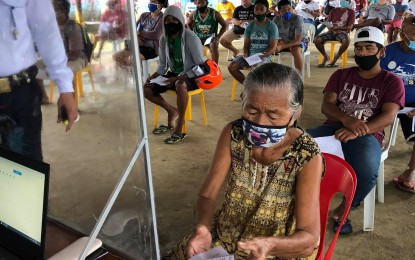By Christine Cudis, Philippine News Agency
MANILA – The Department of Social Welfare and Development’s (DSWD) partnership with different financial service providers (FSPs) for the implementation of the social amelioration program (SAP) has not only hastened the distribution process but also provided convenience to beneficiaries through digital banking.
“Figures show that SAP beneficiaries perform more digital transactions even after claiming their cash aid,” DSWD spokesperson Irene Dumlao told reporters in a Viber message on Friday.
Most of the family beneficiaries have created digital bank or wallet accounts, initially to have access to the SAP aid.
However, partner FSPs found out that even after receiving their aid, the beneficiaries continued to use the electronic platform.
The partner FSPs will provide data that reflects movement among the beneficiaries, Dumlao added.
In an earlier uSAP Tayo press briefer, Social Welfare Secretary Rolando Bautista said tapping the FSPs, to help distribute the emergency aid for low-income families across the country, paved the way for “financial inclusivity”, which is also a huge part of the DSWD’s vision.
In a social media post, the DSWD said aside from complying with the Inter-Agency Task Force for the Management of Emerging Infectious Diseases’ (IATF-IED) protocols on physical distancing, the FSPs “offer an opportunity to register Filipinos into a banking institution and avail of their many services and financial programs.”
BSP: Only 15.8-M adult Pinoys had bank accounts
In July 2018, the Bangko Sentral ng Pilipinas (BSP) released its annual Financial Inclusion Survey, which showed that about 77 percent or 52.8 million Filipino adults do not have bank accounts.
This means that in the year before the survey was released, only 15.8 million adult Filipinos, or 22.6 percent, had bank accounts.
“Ownership of a bank account that can be used to save and receive money, as well as pay bills, is a basic indicator of financial inclusion,” the survey said.
It also found that 70 percent of Filipinos who are not registered in any banking institution cited convenience as a key factor in choosing a channel for remittance transactions.
Other factors considered were cheaper charges, physical access points, and faster services.
For the implementation of the second tranche of the SAP, the DSWD reached out to the experts in BSP for a list of recommended FSPs that can assist the department in distributing the cash aid.
The BSP-identified FSPs are GCash, PayMaya, Rizal Commercial Banking Corp. (RCBC), Robinsons Bank, Starpay, and Unionbank.
The six qualified for the program for having presence of business model institutions, historical experience in commercial rollout, and type of cash-out points that may contribute to ensuring liquidity or availability of cash, the DSWD said in a statement.
The current arrangement will give the beneficiaries a transaction account, which they can use to save money, pay bills, and receive any future assistance in an efficient manner rather than a one-time transaction for disbursement.
Thus, other FSPs that cannot create restricted transaction accounts were not included, the DSWD added.
Increase in downloads of Diskartech
Recently, DiskarTech, RCBC’s digital product for SAP beneficiaries, took the top spot among free finance apps in Google Play for Android users in the first month since it was launched in early July.
Among iOS devices users, the app ranked second among free finance apps on the App Store, overtaking those that have been available in the market for years.
As of July 30, downloads of DiskarTech have breached half-a-million downloads in less than four weeks, with a total of 531,956.
“This means that at least 50 Filipinos are downloading the DiskarTech app every minute,” the RCBC said in an email.
DiskarTech offers a digital savings account that requires no initial deposit or maintaining balance.
It is also the first of its kind whose interface is wholly rendered in conversational Taglish, a mix of Tagalog and English.
“We want unbanked and underserved Filipinos to take advantage of the benefits of being part of the formal financial system. This has been RCBC’s thrust of promoting inclusive digital finance, which was further accelerated by the Covid-19 pandemic,” RCBC president Eugene Acevedo said in a statement.
The users of Diskartech with verified basic deposit accounts earn a competitive 3.25-percent interest on their savings, which is also insured with the Philippine Deposit Insurance Corp., Acevedo added.
“Recent events have forced many of us to the digital realm – financial services included. We can leverage on this development to achieve our financial inclusion goals. This is what DiskarTech does as the country’s first ‘Taglish’ app. It provides sachet banking services to unbanked and underserved Filipinos,” BSP Governor Benjamin Diokno said in a social media post in July. (PNA)

